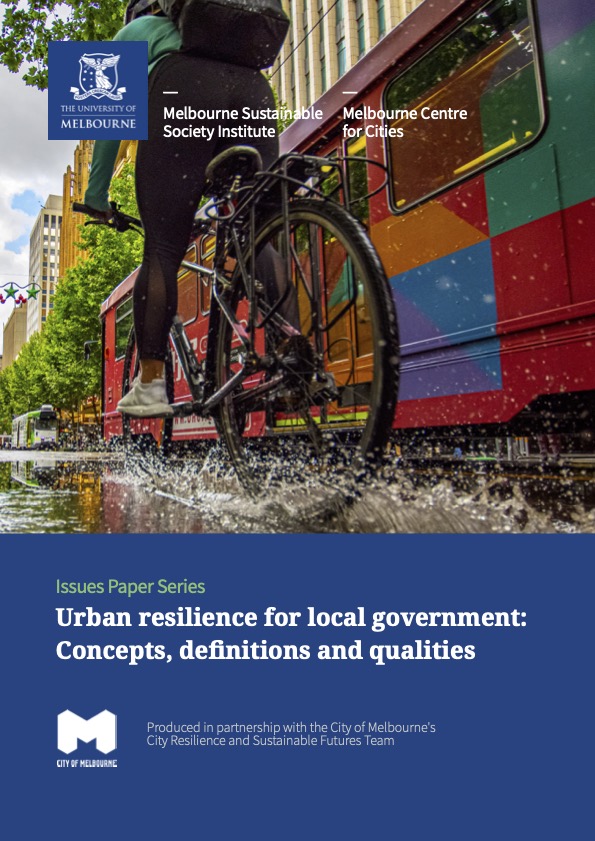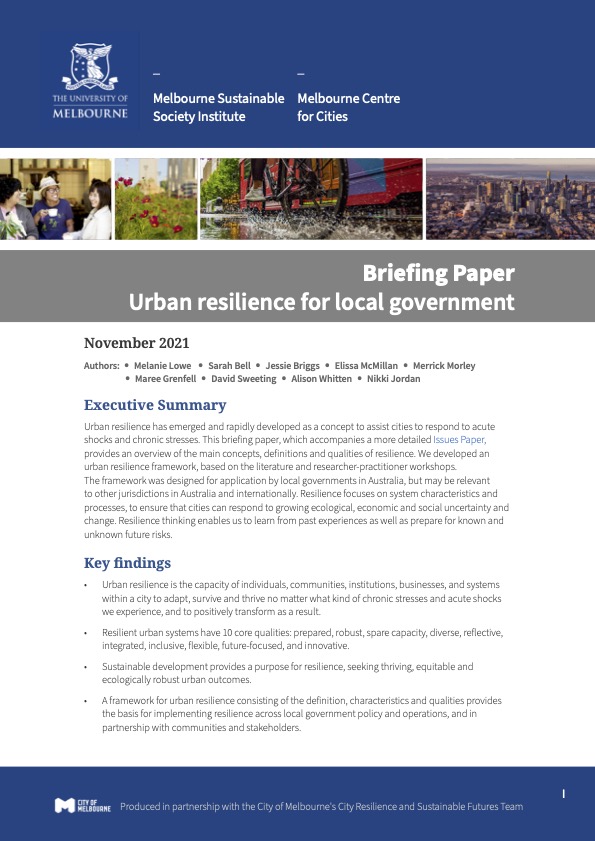Urban Resilience: What's next for Melbourne?

As Melbourne emerges from one of the world's longest lockdowns under
COVID-19 restrictions, what have we learnt about the resilience of cities to shocks and stresses? What lessons can we draw for future challenges, such as the task of decarbonising our cities and industries, or coping with the impacts of climate change?
The Melbourne Sustainable Society Institute (MSSI) hosted the launch of a new MSSI Issues Paper, titled Urban resilience for local government: Concepts, definitions and qualities, produced in partnership with the Melbourne Centre for Cities and the City of Melbourne's City Resilience and Sustainable Futures team.
The launch outlined an urban resilience framework, including an updated definition of urban resilience:
The capacity of individuals, communities, institutions, businesses and systems within a city to adapt, survive, and thrive no matter what kind of chronic stresses and acute shocks we experience, and to positively transform as a result.
A panel discussion then explored how the updated urban resilience framework can be applied by state and local governments, chaired by lead author Dr Melanie Lowe and involving Prof Sarah Bell, the City of Melbourne Chair in Urban Resilience and Innovation at MSSI.
Panellists discussed the current importance of urban resilience, how we can be better prepared for city challenges, and the role of the unique and evolving partnership between the City of Melbourne and the University of Melbourne via Prof Bell's appointment at MSSI.
Speakers
Cr Nicholas Reece was elected as a Councillor to the City of Melbourne in 2016 and was elected Deputy Lord Mayor in 2020. Cr Reece is the portfolio Lead for Planning and Deputy Lead for Finance, Governance and Risk. He is an executive at the University of Melbourne and Principal Fellow and Lecturer at the Melbourne School of Government. He has considerable experience in government and policymaking having worked in senior roles including Deputy Chief of Staff for Prime Minister Julia Gillard and Victorian Premiers Steve Bracks and John Brumby.
Professor Sarah Bell is the City of Melbourne Chair in Urban Resilience and Innovation at the Melbourne Sustainable Society Institute at the University of Melbourne. Prior to this, she worked for 16 years at University College London as Professor of Environmental Engineering at The Bartlett School of Environment, Energy and Resources. Her scholarly work draws on the social sciences to better understand how people, technologies and nature interact to create urban systems.
Joel Backwell is the Regional Director for Inner Metropolitan Melbourne in the Victorian Department of Jobs, Precincts and Regions. He works across government on the recovery and long-term revitalisation of the inner city, with a particular focus on inclusive economic development. Prior to taking up his current role, Joel headed the International Education Division in the Department of Education and Training. He was previously the Australian Trade Commissioner to Malaysia and Brunei, based in Kuala Lumpur, and worked for law firm Freehills across Southeast Asia.
Andrew Wear is City Economist and Director of Economic Development at the City of Melbourne. He is a Victorian Fellow of the Institute of Public Administration Australia, and a director of Ardoch Ltd, a children’s education charity. Andrew is also an author who is passionate about searching the world for policy solutions that work. In 2020, his first book, Solved! How other countries have cracked the world’s biggest problems and we can too was published around the world. His latest book is Recovery. How we can create a better, brighter future after a crisis.
Chair
Dr Melanie Lowe is a Research Fellow in Urban Resilience and Innovation at the Melbourne Sustainable Society Institute at the University of Melbourne. Her research investigates how to plan healthy and resilient cities, the use of indicators to monitor and inform policy, and integrated planning across sectors, highlighting the co-benefits that can be achieved for human health, sustainable development and urban resilience. She works with researchers and policymakers to strengthen consideration of health in city planning.
Read the new Issues Paper and accompanying Briefing Paper.

